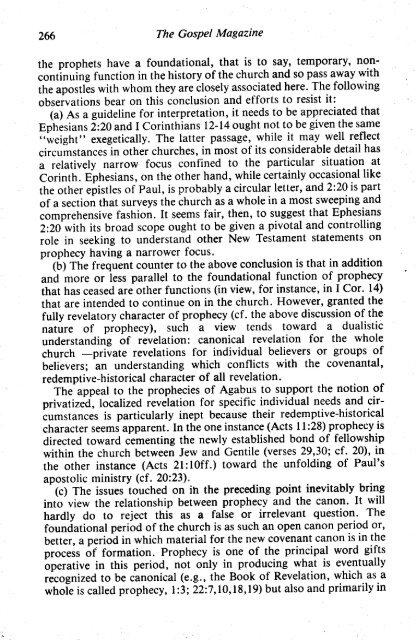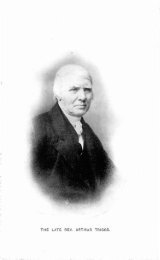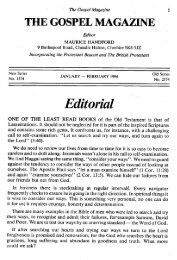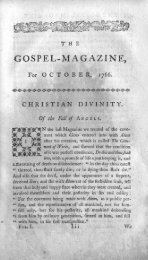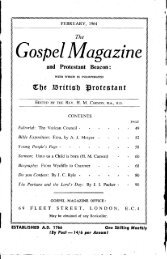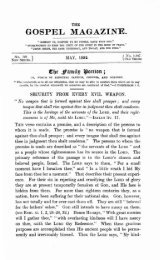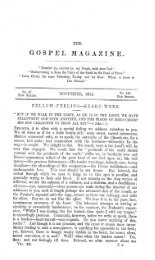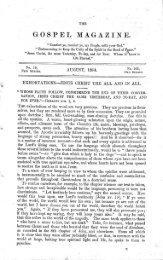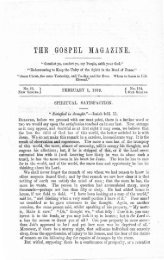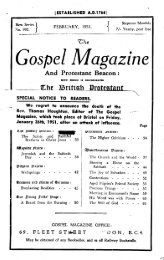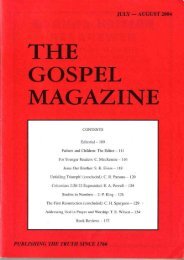November-December - The Gospel Magazine
November-December - The Gospel Magazine
November-December - The Gospel Magazine
You also want an ePaper? Increase the reach of your titles
YUMPU automatically turns print PDFs into web optimized ePapers that Google loves.
266 <strong>The</strong> <strong>Gospel</strong> <strong>Magazine</strong><br />
the prophets have a foundational, that is to say, temporary, noncontinuing<br />
function in the history of the church and so pass away with<br />
the apostlis with whom they are closely associated here. <strong>The</strong> following<br />
obseivations bear on this conclusion and efforts to resist it:<br />
(a) As a guideline for interpretation, it needs to be appreciated that<br />
Ephesians i:20 and I Corinthians 12-14 ought not to be given the same<br />
,,weight" exegetically. <strong>The</strong> latter passage, while it may well reflect<br />
circuirstancesln other churches, in most of its considerable detail has<br />
a relatively narrow focus confined to the particular situation at<br />
corinth. Ephesians, on the other hand, while certainly occasional like<br />
the other eiistles of paul, is probably a circular letter, and 2:20 is part<br />
of a section that surveys the thurch as a whole in a most sweeping and<br />
comprehensive fashion. It seems fair, then, to suggest that Ephesians<br />
2:20 with its broad scope ought to be given a pivotal and controlling<br />
role in seeking to understand other New Testament statements on<br />
prophecy ' having a narrower focus.<br />
(b) rtre frequent counter to the above conclusion is that in addition<br />
and.more or iess parallel to the foundational function of prophecy<br />
that has ceased are other functions (in view, for instance, in I Cor. 14)<br />
that are intended to continue on in the church. However, granted the<br />
fully revelatory character of prophecy (cf. the above discussion of the<br />
nature of prophecy), such a view tends toward a dualistic<br />
understanding of revelation: canonical revelation for the whole<br />
church -private revelations for individual believers or groups of<br />
believers: an understanding which conflicts with the covenantal,<br />
redemptive-historical character of all revelation.<br />
<strong>The</strong> appeal to the prophecies of Agabus to support the notion of<br />
privatized, localized revelation for specific individual needs and circumstances<br />
is particularly inept because their redemptive-historical<br />
character seems apparent. In the one instance (Acts I l:28) prophecy is<br />
directed toward cementing the newly established bond of fellowship<br />
within the church between Jew and Gentile (verses 29,30:, cf.20), in<br />
the other instance (Acts 2l:loff.) toward the unfolding of Paul's<br />
apostolic ministry (ct. 20:23).<br />
(c) <strong>The</strong> issues'touched on ih the preceding point inevitably-bring<br />
into'view the relationship between prophecy and the canon. It will<br />
hardly do to reject this as a false or irrelevant question' <strong>The</strong><br />
foundational peribd of the church is as such an open canon period or,<br />
better, a period in which material for the new covenant canon is in the<br />
pro..it of formation. Prophecy is one of the principal word gifts<br />
bperative in this period, not only in producing what is eventually<br />
recognized to be canonical (e.g., the Book of Revelation, which as a<br />
whol-e is called prophecy, l:3; 22:7,10,18,19) but also and primarily in


